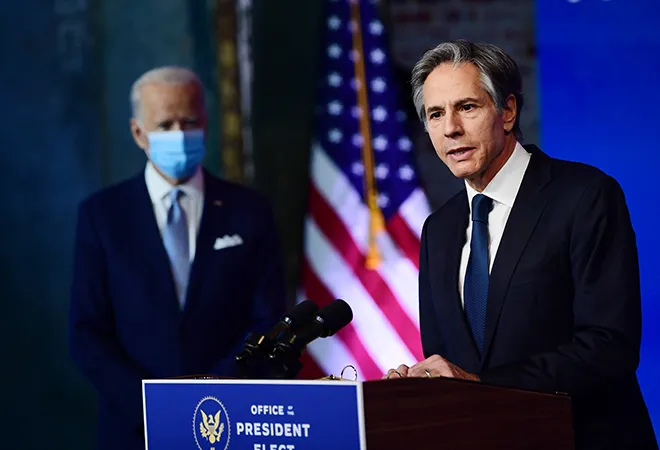-
CENTRES
Progammes & Centres
Location

“The worst of revolutions is a restoration.”
--Charles James Fox, nineteenth century Whig statesman
Last week’s political risk analysis makes it crystal clear that—given the Republican strength in the House and especially the Senate—Joe Biden’s new administration will focus not on domestic matters (as was thought likely) but instead on foreign policy, as this is the policy realm where he has by far the most room for maneuver.
Here, Biden’s foreign policy will be all about restoration. Specifically, he wishes to recreate the dominance of the Wilsonian world view of the long-lamented (by Democrats at least) Obama administration. However, beneath this heartfelt desire lurks several major real-world problems.
Biden’s foreign policy will be all about restoration. Specifically, he wishes to recreate the dominance of the Wilsonian world view of the long-lamented (by Democrats at least) Obama administration
First, as former Secretary of Defense Robert Gates pointed out in his memoirs, in his view Joe Biden is a man, “who has been wrong on nearly every major foreign policy and national security issue over the past four decades.”
Biden and his chief aide—soon to be Secretary of State Tony Blinken—were catastrophically wrong about the Iraq war. They were wrong about the US remaining endlessly in Afghanistan. They were wrong about Obama’s naive ‘reset’ with Russia. They were wrong about the disastrous intervention in Libya. Perhaps, most of all, they were wrong in following the US foreign policy establishment’s groupthink over the past two decades in viewing Beijing’s rise as fundamentally benign. Frankly, in concrete terms, it is hard to fathom why anyone would want to restore a record as doleful as this.
If there is one facet of the restoration that is most important to the Biden foreign policy team, it is surely that of restoring American alliances to their central place in foreign policy thinking. Our present loose bipolar system contains two superpowers (the US and China), but also a number of great powers just beneath them—India, Japan, the Anglosphere countries, the European Union (EU) and Russia—all of whom have a large degree of independence in setting their overall foreign policy course and whose tilting toward one superpower or another (or deciding to take a more strictly neutral stance in the new Cold War) will play a large role in determining the contest’s strategic outcome.
If there is one facet of the restoration that is most important to the Biden foreign policy team, it is surely that of restoring American alliances to their central place in foreign policy thinking
Here, the US has a gigantic advantage, as India, Japan, the Anglosphere countries, and the EU will all either hew to a pro-American or neutralist position, with only Russia throwing in its lot with Beijing or remaining aloof.
But a basic problem with Biden’s foreign policy restoration is that in practice, the restoring alliances mantra amounts to more of a bumper sticker than an actual foreign policy; it is an aspiration in need of a plan.
For example, in the Indo-Pacific, largely thanks to the skillful and unsung diplomatic skills of outgoing Japanese Prime Minister Shinzo Abe, Tokyo has often taken the strategic lead in forming geostrategic (The Quadrilateral Initiative, or the Quad) institutions designed to rally the region against Chinese aggression. Encouraged, Biden has pledged to build up these already burgeoning Asian alliances.
Indeed, due to Beijing’s serious strategic miscalculations under the increasingly bellicose leadership of President Xi Jinping, the US finds itself with very good geopolitical cards to play in Asia. The US is closer to great power India and old rival Vietnam than it ever has been, and as close to longstanding allies Japan, Australia, and the ASEAN countries as it has ever found itself.
This is less a result of clever diplomatic gambits on America’s part, and more the result of China’s threatening posture in the East China and South China Seas; crackdowns in its western Xinjiang Province, Tibet and Hong Kong; military clashes with India along their common border; and increasing verbal hostility towards Australia and Taiwan. China has frightened the region, and it has redounded to America’s strategic benefit.
So given this tremendous geostrategic opportunity, and the new administration’s general Wilsonian desires to build up America’s alliances, what can go wrong? Sadly, plenty. As to the Quad (composed of Japan, the US, Australia, and India), Biden said almost nothing about it during the campaign, despite the fact that it has blossomed into the fledgling geopolitical grouping of the region directed at building up a strategic alliance to deter Chinese aggression in the Indo-Pacific.
How to build on what has already been done, what new members to admit, and what the Quad actually intends to do operationally are all questions that ought to have already been answered. In not doing so, Biden has called into question what building up alliances in Asia actually amounts to in practice.
No one is doubting that building up America’s alliances now must be a priority of US foreign policy. However, what is called for is not aspirational sloganeering, but an actual developed strategic plan.
No one is doubting that building up America’s alliances now must be a priority of US foreign policy. However, what is called for is not aspirational sloganeering, but an actual developed strategic plan.
There is then real peril in the new administration’s efforts to restore the foreign policy of the Obama administration. Overrated on its own historical merits, beyond this such a foreign policy—much like the pleasant-sounding but inconsequential rhetoric of the former president—amounts to much less than meets the eye.
The views expressed above belong to the author(s). ORF research and analyses now available on Telegram! Click here to access our curated content — blogs, longforms and interviews.

John C. Hulsman is President and Managing Partner of John C. Hulsman Enterprises a political risk consulting firm. He is also a life member of ...
Read More +